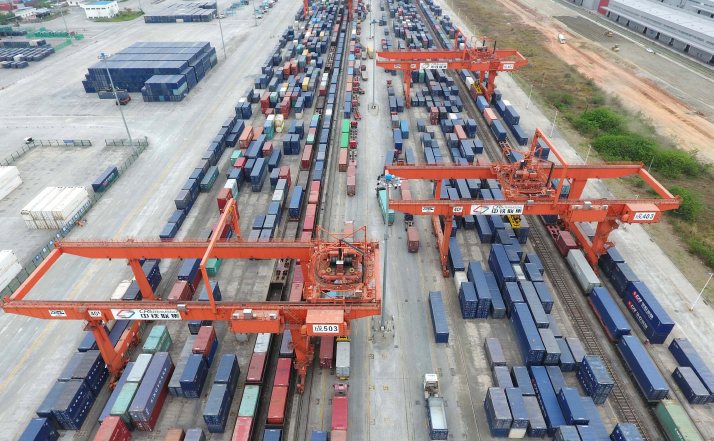China's western regions accelerate opening up amid epidemic
Despite the impact of the COVID-19 epidemic, the southwestern Chinese city of Chengdu registered a stellar foreign trade performance in the first half of this year.
Despite the impact of the COVID-19 epidemic, the southwestern Chinese city of Chengdu registered a stellar foreign trade performance in the first half of this year.

Chengdu's total foreign trade volume from January to June topped 323 billion yuan (about US$46 billion), up 23.5 percent from the same period last year.
The city's foreign trade rebounded strongly since March, recording double-digit monthly growth ever since, said Pan Xudong, an official with Chengdu customs.
"The spread of the COVID-19 epidemic has put immense pressure on the global supply chain," said Liu Zimin, a professor with Southwest University, based in southwest China's Chongqing municipality. "However, western Chinese cities such as Chengdu have taken effective measures on curbing the epidemic and resuming production, which enable them to provide stable supplies of goods to foreign trade partners."
This sends a strong message to the world that the epidemic will not impede China's opening-up, said Liu, who was a visiting scholar at Harvard University.
In late February, automaker Volvo's plant in Chengdu gradually resumed its exports to the European market, shipping products to European countries via China-Europe freight trains.
In the first half of this year, the number of exported made-in-Chengdu Volvo vehicles rose 38.7 percent, compared with the same period last year, according to Volvo Cars China.
Over the past months, local authorities in Chengdu swiftly implemented policies to help resume an air freight network that had been impacted by the epidemic.
At the height of the epidemic, the lack of air freight capacity, which was caused by the grounding of passenger flights, led to serious cargo backlog and an upsurge in rates, said Guo Wei, head of Central West District of DHL Global Forwarding (China) Co., Ltd.
With government policies, such as subsidies, secured cabotage, and improved customs and ground support services, DHL was able to clear its backlog and help local businesses resume trading, added Guo.
"Efforts to stabilize the global supply chain had made Chengdu Shuangliu International Airport one of the busiest airports in the world in May," said Xia Ying, a customs and logistics official with the Chengdu municipal government.
In June, the year-on-year decline in cargo flights and handling capacity of the airport had narrowed to single-digit, according to data from Southwest Regional Administration of Civil Aviation Administration of China.
For years, China has pushed for a broader opening-up in its vast western regions. Since 2017, China has set up five pilot free trade zones (FTZs) in provincial-level western regions, in a bid to improve the business environment and widen opening-up.
Meanwhile, the China-Europe freight train services, many of which depart from western Chinese cities, have emerged as an important logistics channel that helps ensure smooth trade between China and Europe.
The number of China-Europe freight trains rose significantly during the first half of this year, with a total of 5,122 train trips made, up 36 percent year on year, according to the China State Railway Group.
"As the Belt and Road construction continues, China's opening-up has gradually expanded to the hinterland in the west," said Zhou Mi, a researcher with the Chinese Academy of International Trade and Economic Cooperation affiliated to the Ministry of Commerce.
The capabilities of China's western regions to provide logistics support to the high-tech sector, as well as its supply of high-caliber talent, remain a huge magnet for foreign investors, said Zhou, adding that China's western regions constitute a market with huge potential.

